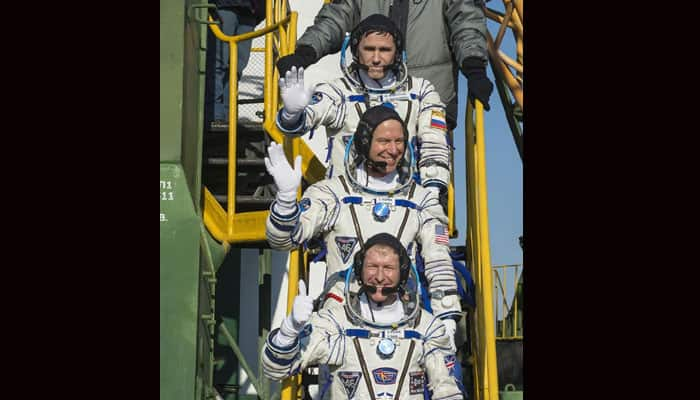Washington: With the arrival of Soyuz spacecraft in International Space Station, three new Expedition 46 astronauts have joined the three residents to continue key research on space that advances NASA's journey to Mars.
Three new Expedition 46 astronauts are Tim Kopra of NASA, Russian Federal Space Agency (Roscosmos) cosmonaut Yuri Malenchenko and ESA (European Space Agency) astronaut Tim Peake. They were launched from the Baikonur Cosmodrome in Kazakhstan, and after orbiting Earth four times, manually docked to the station on Tuesday.
Also Read: Astronauts repair dead computer outside International Space Station
The trio were joined by Commander Scott Kelly of NASA and flight engineers Sergey Volkov and Mikhail Kornienko of Roscosmos.
During more than five months on humanity's only microgravity laboratory, the Expedition 46 crew members will conduct over 250 science investigation in fields including biology, Earth science, human research, physical sciences and technology development, the US space agency said in a statement.
Till early June 2016, Kopra, Malenchenko and Peake will remain aboard the station.
Also Read: Discovery docks with international space station
Kelly and Kornienko will return to the Earth at the conclusion of their one-year mission on March 1, 2016, along with Volkov.
The pair will have spent 340 consecutive days living and working in space to advance understanding of the medical, psychological and biomedical challenges astronauts face during long duration spaceflight, in addition to developing countermeasures to reverse those effects.
Ongoing research includes the "Microbial Payload Tracking Series" project which uses microbial analysis techniques to establish a census of the microorganisms living on surfaces and in the atmosphere of the space station.
Analysing these microbes can help determine whether some are more virulent in space and which genetic changes might be involved in this response.
Results from the investigation can be used to evaluate cleaning strategies, and to mitigate microbe-related risks to crew health and spacecraft system performance.
The crew members are scheduled to receive several cargo spacecraft -- including multiple US commercial resupply vehicles from SpaceX and Orbital ATK -- each delivering tonnes of food, fuel, supplies and research.
For 15 years, humans have been living continuously aboard the station to advance scientific knowledge and demonstrate new technologies, making research breakthroughs not possible on the Earth that also will enable long-duration human and robotic exploration into deep space.
A truly global endeavour, over 200 people from 15 countries have visited the unique microgravity laboratory that has hosted more than 1,700 research investigations from researchers in more than 80 countries.
(With IANS inputs)
















